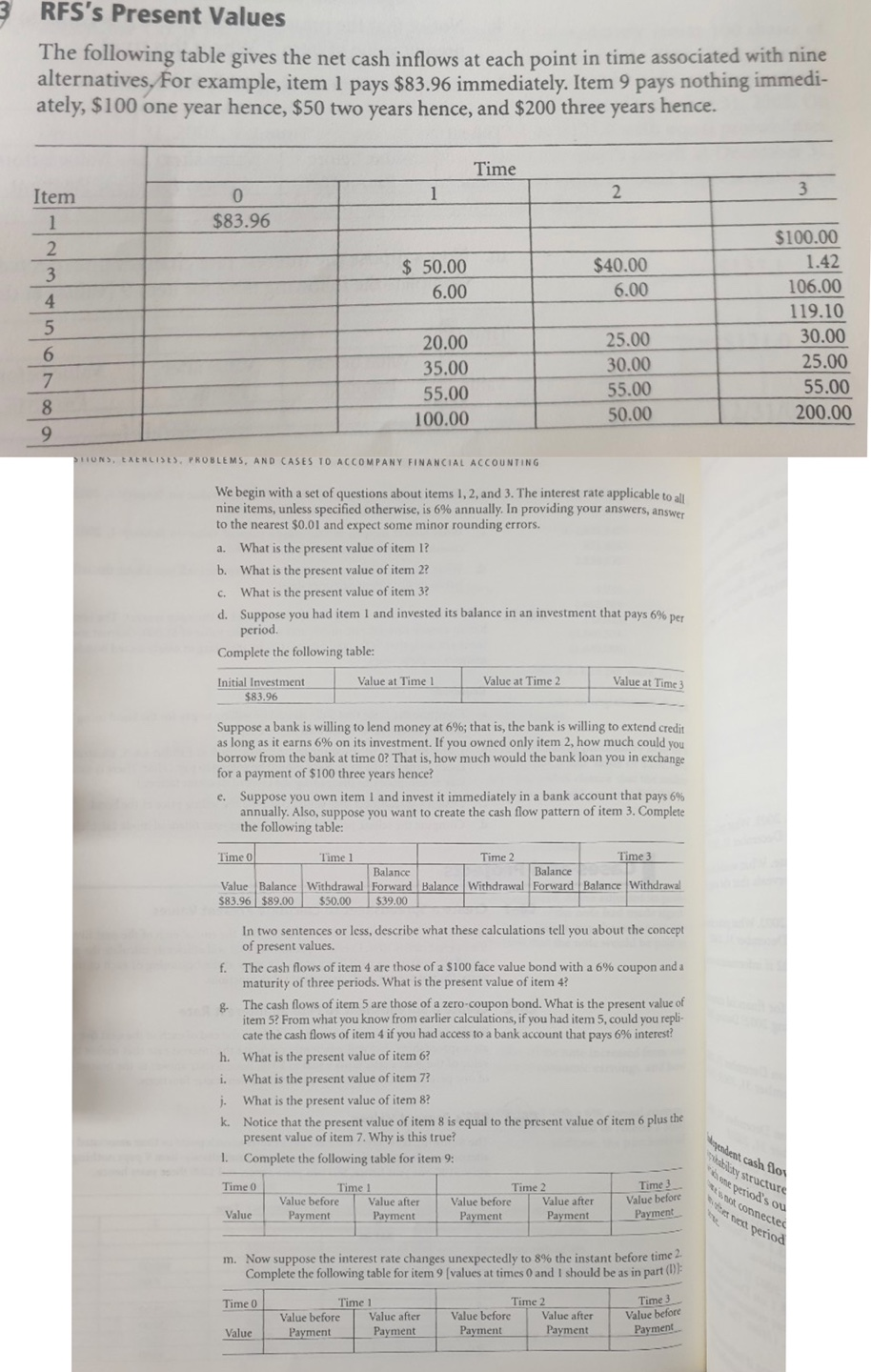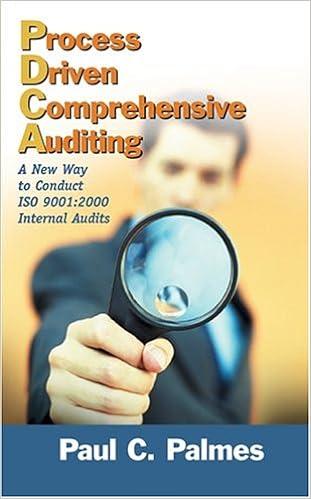 RFS's Present Values the questions are a to m
RFS's Present Values the questions are a to m
RFS's Present Values The following table gives the net cash inflows at each point in time associated with nine alternatives, for example, item 1 pays $83.96 immediately. Item 9 pays nothing immedi- ately, $100 one year hence, $50 two years hence, and $200 three years hence. Time Item 2 $83.96 $ 50.00 6.00 $40.00 6.00 $100.00 1.42 106.00 119.10 30.00 25.00 55.00 200.00 20.00 35.00 55.00 100.00 25.00 30.00 55.00 50.00 EXERCISES. PROBLEMS, AND CASES TO ACCOMPANY FINANCIAL ACCOUNTING We begin with a set of questions about items 1, 2, and 3. The interest rate applicable to all nine items, unless specified otherwise, is 6% annually. In providing your answers, answer to the nearest $0.01 and expect some minor rounding errors. a. What is the present value of item I? b. What is the present value of item 2? c. What is the present value of item 3? d. Suppose you had item 1 and invested its balance in an investment that pays 6% per period. Complete the following table: Value at Time 1 Value at Time 2 Initial Investment $83.96 Value at Time 3 Suppose a bank is willing to lend money at 6%; that is, the bank is willing to extend credit as long as it earns 6% on its investment. If you owned only item 2, how much could you borrow from the bank at time 0? That is, how much would the bank loan you in exchange for a payment of $100 three years hence? e. Suppose you own item 1 and invest it immediately in a bank account that pays 6% annually. Also, suppose you want to create the cash flow pattern of item 3. Complete the following table: Time 0 Timel Time 2 Time 3 Balance Balance Value Balance Withdrawal Forward Balance Withdrawal Forward Balance Withdrawal $83.96 $89.00 $50.00 $39.00 In two sentences or less, describe what these calculations tell you about the concept of present values. f. The cash flows of item 1 are those of a $100 face value bond with a 6% coupon and a maturity of three periods. What is the present value of item 4? g. The cash flows of item 5 are those of a zero-coupon bond. What is the present value of item 5? From what you know from earlier calculations, if you had item 5, could you repli- cate the cash flows of item 4 if you had access to a bank account that pays 6% interest? h. What is the present value of item 6? i. What is the present value of item 7? j. What is the present value of item 8? k. Notice that the present value of item 8 is equal to the present value of item 6 plus the present value of item 7. Why is this true? 1. Complete the following table for item 9: Synt, cash flos structure Time 0 Time 1 Value after Payment Time 2 Value before Value after Payment Payment Time 3 Value before Payment vi&sou connecter et period Value Payment m. Now suppose the interest rate changes unexpectedly to 8% the instant before time Complete the following table for item 9 [values at times 0 and I should be as in part (UF Time 0 Time 1 Value before Value after Payment Payment Time 2 Value before Value after Payment Payment Time 3 Value before Payment Value RFS's Present Values The following table gives the net cash inflows at each point in time associated with nine alternatives, for example, item 1 pays $83.96 immediately. Item 9 pays nothing immedi- ately, $100 one year hence, $50 two years hence, and $200 three years hence. Time Item 2 $83.96 $ 50.00 6.00 $40.00 6.00 $100.00 1.42 106.00 119.10 30.00 25.00 55.00 200.00 20.00 35.00 55.00 100.00 25.00 30.00 55.00 50.00 EXERCISES. PROBLEMS, AND CASES TO ACCOMPANY FINANCIAL ACCOUNTING We begin with a set of questions about items 1, 2, and 3. The interest rate applicable to all nine items, unless specified otherwise, is 6% annually. In providing your answers, answer to the nearest $0.01 and expect some minor rounding errors. a. What is the present value of item I? b. What is the present value of item 2? c. What is the present value of item 3? d. Suppose you had item 1 and invested its balance in an investment that pays 6% per period. Complete the following table: Value at Time 1 Value at Time 2 Initial Investment $83.96 Value at Time 3 Suppose a bank is willing to lend money at 6%; that is, the bank is willing to extend credit as long as it earns 6% on its investment. If you owned only item 2, how much could you borrow from the bank at time 0? That is, how much would the bank loan you in exchange for a payment of $100 three years hence? e. Suppose you own item 1 and invest it immediately in a bank account that pays 6% annually. Also, suppose you want to create the cash flow pattern of item 3. Complete the following table: Time 0 Timel Time 2 Time 3 Balance Balance Value Balance Withdrawal Forward Balance Withdrawal Forward Balance Withdrawal $83.96 $89.00 $50.00 $39.00 In two sentences or less, describe what these calculations tell you about the concept of present values. f. The cash flows of item 1 are those of a $100 face value bond with a 6% coupon and a maturity of three periods. What is the present value of item 4? g. The cash flows of item 5 are those of a zero-coupon bond. What is the present value of item 5? From what you know from earlier calculations, if you had item 5, could you repli- cate the cash flows of item 4 if you had access to a bank account that pays 6% interest? h. What is the present value of item 6? i. What is the present value of item 7? j. What is the present value of item 8? k. Notice that the present value of item 8 is equal to the present value of item 6 plus the present value of item 7. Why is this true? 1. Complete the following table for item 9: Synt, cash flos structure Time 0 Time 1 Value after Payment Time 2 Value before Value after Payment Payment Time 3 Value before Payment vi&sou connecter et period Value Payment m. Now suppose the interest rate changes unexpectedly to 8% the instant before time Complete the following table for item 9 [values at times 0 and I should be as in part (UF Time 0 Time 1 Value before Value after Payment Payment Time 2 Value before Value after Payment Payment Time 3 Value before Payment Value
 RFS's Present Values the questions are a to m
RFS's Present Values the questions are a to m





